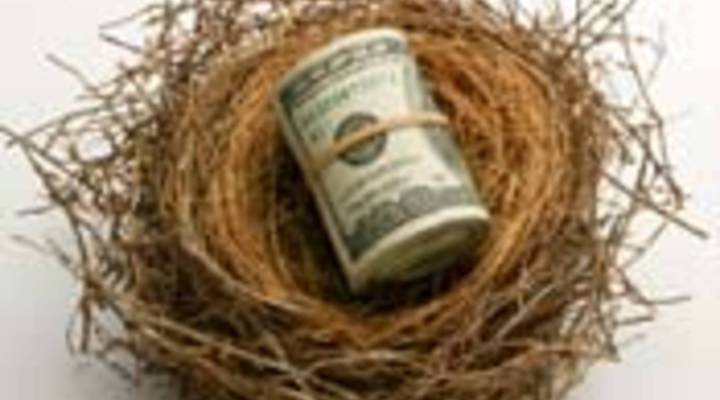
Keeping a retirement income fund

TEXT OF INTERVIEW
Tess Vigeland: All right, let’s go from thinking about starting a new career
To thinking about how to end the one you’re in now. At this point lots of us have abandoned the idea that once you hit retirement age. The only thing you have to worry about is your golf game. Nowadays you really have to plan to keep money coming in. No matter how old you are. And that’s the thinking behind something called a Retirement Income Fund.
Bob Frick is a senior editor at Kiplinger’s Magazine Bob, can you explain what these funds are supposed to do?
Bob Frick: They’re kind of the reverse of target date funds, but instead of putting money in regularly, they’re going to pay you money out on a monthly basis. So you’re retired, you want steady income, you sock your money into one of these and they basically dole it back to you after investing it well, you know, a month at a time.
Vigeland: What is the advantage, if any, of retirement income funds, or disadvantage over other investment options?
Frick: Well, I think the advantages are it’s a diversified portfolio, and you know, that sounds simple, but you also know, most people don’t use them. And a diversified portfolio is magic ? it’s the only free lunch you get in investing. So, most people are going to be a quantum leap ahead in their retirement investing if they’re simply diversified and that goes a long way.
Vigeland: So who would this be good for? Just your average investor? Anybody? Any age?
Frick: I think it’s good for people who need to be kind of on a budget because if you’re really good at investing and have discipline, and few of us are, these funds provide the discipline for you. So, lets say you’re 65 or 70, you’re retired, you’ve got your nest egg, you want it paid back to you in a disciplined way and invested in a good portfolio, then these are fine for you. The problem is, all of these things started right when the bear market started a year ago, so the timing could not be worse.
Vigeland: So this is something that you get into once you have retired; it’s not something that you’re going to want to have as a 25 year old.
Frick: No. Absolutely not. Target date funds rely ? again those are diversified portfolios ? these are diversified portfolios, but they pay you back. You don’t want invest in these to grow your nest egg; you want to invest in these to shrink your nest egg.
Vigeland: So based on what you’ve said about retirement income funds, it sounds like they are invested in a mix of stocks, bonds?
Frick: Exactly. Stocks, bonds, overseas domestics, small cap, big cap ? and we love that. The only thing we have to worry about is if the market tanks, you have to re-negotiate your retirement ? you have to stop taking money out, you got to work longer, you go to do something to make your money last longer.
Vigeland: But why is that? Explain for us how the amount of the pay-out is determined. I think that’s what you’re talking about here ? the market is somehow determining what your payout is.
pay-out
Frick: Right. So let me just speak generically. We had a lousy year ? that’s not generic, that’s the truth. We’ve had a lousy year in the stock market. At the end of the year they’re going to look at the assets in these funds and they’re going to determine based on that basically what the payout is going to be. Now they’re going to make a promise up front that the pay-out is going to be, say, seven percent per year, you know, which is pretty good. What happens though if that market tanks? Now all of the sudden you’re going to be getting your seven percent back, but it’s going to be seven percent of a smaller nest egg, so your payment is going to go down. On the other hand, what if the market, as we all hope, rebounds ? you know, it’s up 30 percent next year or something ? then all of the sudden your pay-out is going to be more, but also your nest egg will have grown and that’ll make you sleep better at night.
Vigeland: OK. Bob Frick is senior editor at Kiplinger Magazine. Thanks so much for coming in.
Frick: You’re so welcome.
There’s a lot happening in the world. Through it all, Marketplace is here for you.
You rely on Marketplace to break down the world’s events and tell you how it affects you in a fact-based, approachable way. We rely on your financial support to keep making that possible.
Your donation today powers the independent journalism that you rely on. For just $5/month, you can help sustain Marketplace so we can keep reporting on the things that matter to you.


















